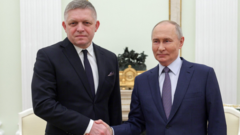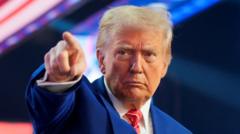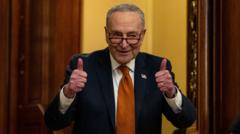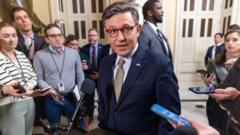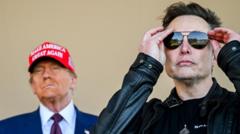With the U.S. presidential election nearing, both Russian officials and the public are disillusioned, believing that neither Donald Trump nor Kamala Harris will change the course of the conflict in Ukraine or U.S.-Russia relations positively.
Russian Disillusionment Ahead of U.S. Presidential Election

Russian Disillusionment Ahead of U.S. Presidential Election
As the U.S. election approaches, Russians express skepticism about the potential for improved relations, regardless of who wins.
Despite their hopes for a speedy resolution to the Ukraine war, Russians are preparing for another round of disappointment as the U.S. presidential election approaches. Many analysts suggest a quiet Kremlin preference for Donald Trump over Vice President Kamala Harris. However, the prevailing sentiment among Russian hard-liners and the general populace is one of pessimism regarding the prospects for improved relations or any real change.
"There is no candidate we feel we can support," asserts Dmitri Kiselyov, an anchor at the state-run Channel 1 TV station. This reaction reflects a largely passive stance towards the election, as Russia faces accusations of disinformation aimed at influencing the outcome. Unlike the optimistic celebrations seen after Trump’s 2016 victory, the ruling class is far more embittered now, viewing the elections as reaffirming a bipartisan consensus aimed at undermining Russian interests.
Dmitri A. Medvedev, former president and currently serving in Russia's Security Council, stated that the elections would not alter anything for Russia, underscoring a belief that both candidates align with ongoing strategies detrimental to Russian aspirations. This sentiment mirrors the disappointment felt towards Trump, whose past praise for Putin contrasts sharply with the decisions he made that were perceived as advantageous to Ukraine.
In summary, whether Trump or Harris takes office, many in Russia foresee no significant shift that could lead to an end to the conflict in Ukraine or a thaw in U.S.-Russia relations. The complex layers of economic sanctions and military strategies are expected to persist, perpetuating a state of uncertainty and disappointment among Russians as they brace themselves for election results.
"There is no candidate we feel we can support," asserts Dmitri Kiselyov, an anchor at the state-run Channel 1 TV station. This reaction reflects a largely passive stance towards the election, as Russia faces accusations of disinformation aimed at influencing the outcome. Unlike the optimistic celebrations seen after Trump’s 2016 victory, the ruling class is far more embittered now, viewing the elections as reaffirming a bipartisan consensus aimed at undermining Russian interests.
Dmitri A. Medvedev, former president and currently serving in Russia's Security Council, stated that the elections would not alter anything for Russia, underscoring a belief that both candidates align with ongoing strategies detrimental to Russian aspirations. This sentiment mirrors the disappointment felt towards Trump, whose past praise for Putin contrasts sharply with the decisions he made that were perceived as advantageous to Ukraine.
In summary, whether Trump or Harris takes office, many in Russia foresee no significant shift that could lead to an end to the conflict in Ukraine or a thaw in U.S.-Russia relations. The complex layers of economic sanctions and military strategies are expected to persist, perpetuating a state of uncertainty and disappointment among Russians as they brace themselves for election results.


